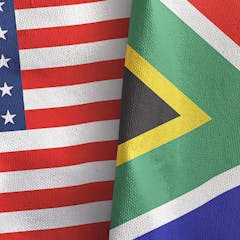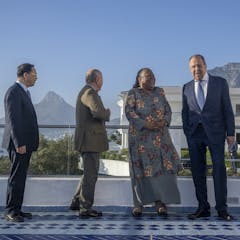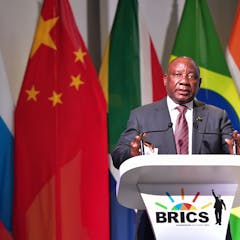
Articles on BRICS
Displaying 1 - 20 of 112 articles

A changing world order and global battles for power will derail the quest for peace in Gaza and the Middle East.

In general, an ageing population puts added pressure on the working-age population to be more productive – just to maintain total output – amid growing fiscal constraints.

Trends of global power tensions, open war, democratic decline and extreme job market fluctuations are likely to continue in 2024

Several key events highlighted the growing ties between China and Africa.

Pretoria needs to pull off a balancing act in managing South Africa’s international relations to advance its economic interests.

Understanding China’s history could help western observers see its foreign policy more clearly.

The war in Ukraine is both a symptom and a cause of a paralysing crisis in the international system. It is up to the Global South to reform the multilateral system.

Russia is not only looking for much-needed ammunition, it is trying to counter Western influence wherever it can.

China’s president Xi Jinping is testing out a “softer” foreign policy approach.

The spectacle of two UN Security Council members — China and Russia — allegedly perpetrating mass atrocity crimes is deeply troubling. Here’s how the international community must step up.

Indonesia has taken a good decision by not joining BRICS, but still needs to be aware that this bloc remains important for the country, and ASEAN.

It would help African countries to have a common position on the Ukraine war. This should be based on its impact on food and energy security in the continent.

As the Brics alliance signs up new members, Russia continues to win over more allies.

The disparate nature of the six prospective members is bound to spark debate about the real nature of Brics.

China is moving beyond oil and extractive commodities towards industrial production, job creation and investments that lead to exports.

The African continent is an obvious contender for courting by major powers.

BRICS nations – Brazil, Russia, India, China and South Africa – compose 41% of the world population and almost a third of global GDP.

Ukraine was able to advance its plan for peace with an audience including China and other Brics nations.

It is not mere expansion, but the character of the expansion which will guide the five Brics countries on whether they admit new members.

There is increased demand to join BRICS in the emerging world order, partly as a countervailing power to “the west”.
